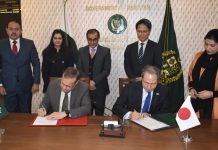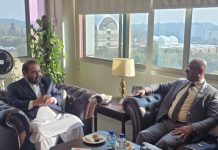By Ajmal Khan Yousafzai
ISLAMABAD: The government can only improve its revenue side by creating an environment conducive for economic activity especially in the current unprecedented challenging external and internal circumstances. However, the budget presented by the federal government shows severe lack of any well-thought-out approach in policy-and budget-making in the turbulent times Pakistan is faced with.
These views emerged at a webinar titled ‘Federal Budget 2020-21: My Impressions and Takeaways’, organized by Institute of Policy Studies (IPS) on Wednesday to review the federal budget.
Khalid Rahman, executive president, IPS was of the view that the country is experiencing extraordinary circumstances and in this situation some innovative ideas were expected in the budget. Addressing the economic challenges the country is experiencing needs out-of-the-box thinking to boost revenue generation, he said.
He deplored that the country’s actual problem is deficit of governance, which is going from bad to worse. “Examples of this can be seen in the petrol shortages and healthcare issues during the pandemic,†he said.
Social support programs cannot be accepted as long-term solutions because these would not promote the culture of becoming self-reliant. The private sector should be motivated to work for supporting the people to become financially stable. The charitable sector has a rare potential in the form of zakat and ushr system. The pandemic has demonstrated that it is not just the government but also private charity that is supporting a large part of the country’s population.
He said successive governments have not taken the lead in sorting out things. The primary focus should be food security, health and energy security but it’s business as usual in the current budget. Zaheeruddin Dar, former civil servant, and economic policy analyst expressed his concern that 27% increase in FBR revenue is expected in the budget. The FBR tax collection target has been set at Rs4.963 trillion while the revised estimate of the closing year was Rs3.908 trillion. In the current situation even collecting Rs3.500 trillion would be a miracle, he added.
He said all FBR revenues are consumption related including sales tax and customs duty. Tax collection will not increase without generation of economic activity. “More revenue cannot be collected just by hiking tax rates,†he added. Over the years Pakistan has not invested in those sectors that can generate additional revenue. He said education, health and economic infrastructure are the three sectors that provide enablement to those economic sectors that generate revenue.
He said the country’s consumption pattern is changing. The lower middle income and lower income groups are highly sensitive to inflation and their consumption patterns change immediately. The government must protect the lower middle income and lower income groups even at the cost of higher income groups.
Mirza Hamid Hasan, former federal secretary water and power also seconded Dar stating that the government has projected 27% increase in tax revenue collection next year without any changes in the tax structure or collection system. “This looks like wishful thinking or maybe this target was fixed because it would be acceptable for the IMF keeping in view their conditions,†he said.
He said the government reduced the power sector subsidy from Rs200 billion to Rs124 billion, which will be harmful for the sector. The independent power producers may go into default and as a result electricity tariffs might increase.






